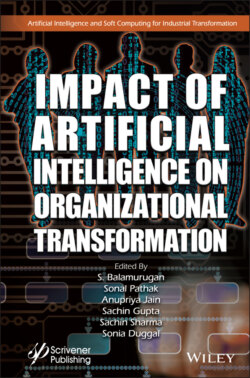Читать книгу Impact of Artificial Intelligence on Organizational Transformation - Группа авторов - Страница 38
References
Оглавление1. Ahuja, A., Heave a sigh of relief HR, Amber’s here to help. [Online] Livemint. Retrieved from https://www.livemint.com/Leisure/G5Dnhxq3i9jt78gDoCgn7K/Heave-a-sigh-of-relief-HR-Ambers-here-to-help.html, 2018.
2. Amla, M. and Malhotra, P.M., Digital Transformation in HR. Int. J. Interdiscip. Multidiscip. Stud. (IJIMS), 4, 3, 536–544, 2017, Retrieved from http://www.ijims.com.
3. McCarthy, J., Programs with Common Sense at the Wayback Machine (archived October 4, 2013), in: Proceedings of the Teddington Conference on the Mechanization of Thought Processes, Her Majesty’s Stationery Office, London, pp. 756–91, 1959.
4. Arbaiy, N. and Suradi, Z., Staff performance appraisal using fuzzy evaluation, in: IFIP International Conference on Artificial Intelligence Applications and Innovations, 2007, September, Springer, Boston, MA, pp. 195–203.
5. de Jesus, A., AI for Pricing–Comparing 5 Current Applications. Emerj. Retrieved from https://emerj.com/ai-sector-overviews/ai-for-pricing-comparing-5-current-applications/2019.
6. Brinker, S., Martec’s Law: the greatest management challenge of the 21st century. [Online] Chiefmartec.com. Retrieved from https://chiefmartec.com/2016/11/martecs-law-great-management-challenge-21stcentury/., 2016.
7. Bughin, J., Seong, J., Manyika, J., Chui, M., Joshi, R., Notes from the AI frontier: Modeling the global economic impact of AI, McKinsey Global Institute, 2018, Retrieved from https://www.mckinsey.com/featured-insights/artificial-intelligence/notes-from-the-ai-frontiermodeling-the-impact-of-ai-on-the-world-economy.
8. Carbonell, J.G., Learning by analogy: Formulating and generalizing plans from past experience, in: Machine learning, pp. 137–161, Springer, Berlin, Heidelberg, 1983.
9. Davenport, T.H., Loucks, J., Schatsky, D., Bullish on the business value of cognitive: Leaders in cognitive and AI weigh in on what’s working and what’s next. Deloitte state of cognitive survey. Retrieved from https://www2.deloitte.com/content/dam/Deloitte/us/Documents/deloitte-analytics/us-da-2017-deloitte-state-of-cognitive-survey.pdf, 2017.
10. Eubanks, B., Artificial intelligence for HR: use AI to support and develop a successful workforce, Kogan Page Limited, United Kingdom, 2018.
11. Forrest, E. and Hoanca, B., Artificial intelligence: Marketing’s game changer, in: Trends and innovations in marketing information systems, pp. 45–64, IGI Global, US, 2015.
12. Gray, K., AI can be a troublesome teammate, Harvard Business Review, Boston, 2017, July 20, Retrieved from https://hbr.org/2017/07/ai-can-be-a-troublesome-teammate, February 11, 2019.
13. Grillo, M., What types of predictive analytics are being used in talent management organizations?, Cornell University, ILR School, New York, 2015.
14. George, G. and Thomas, M.R., Integration of Artificial Intelligence in Human Resource. Int. J. Innov. Technol. Exploring Eng. (IJITEE), 9, 2, 5069–5073, 2019, Blue Eyes Intelligence Engineering & Sciences.
15. Guenole, N. and Feinzig, S., The Business Case for AI in HR. With Insights and Tips on Getting Started, IBM Smarter Workforce Institute, IBM Corporation. [Google Scholar], Armonk, 2018.
16. Jarek, K. and Mazurek, G., Marketing and Artificial Intelligence. Cent. Eur. Bus. Rev., 8, 2, 46–55, 2019.
17. Jia, Q., Guo, Y., Li, R., Li, Y., Chen, Y., A conceptual artificial intelligence application framework in human resource management, in: Proceedings of the International Conference on Electronic Business, pp. 106–114, 2018.
18. Joshi, A., Son, J., Roh, H., When can women close the gap? A meta-analytic test of sex differences in performance and rewards. Acad. Manage. J., 58, 5, 1516–1545, 2015.
19. Kim, T. and Duhachek, A., The impact of artificial agents on persuasion: A construal level account, in: ACR Asia-Pacific Advances, 2018.
20. Krivkovich, A., Robinson, K., Starikova, I., Valentino, R., Yee, L., Women in the Workplace 2017, LearnIn. org, Retrieved from https://www.mckinsey.com/featuredinsights/gender-equality/women-in-theworkplace-2017.
21. Lesgold, A., Lajoie, S., Bunzo, M., Eggan., G., SHERLOCK: A Coached Practice Environment for an Electronics Troubleshooting Job, Pittsburgh University, Learning Research and Development Center, 1988.
22. McCarthy, J. What is artificial intelligence. Technical report, Stanford University, http://www-formal.stanford.edu/jmc/whatisai.html, 2004.
23. Maraziti, P., 2020. Tomorrow’s Workpplace: Humans And AI Co-existing As Colleagues. [Online] Business World. Retrieved from http://bwpeople.businessworld.in/article/Tomorrow-s-Workplace-Humans-And-AI-Co-existing-As-Colleagues/25-01-2020-182461/.
24. Marr, B., The 10 Best Examples Of How Companies Use Artificial Intelligence In Practice. [online] Forbes. Retrieved from https://www.forbes.com/sites/bernardmarr/2019/12/09/the-10-best-examples-of-how-companies-use-artificial-intelligence-in-practice/, 2019.
25. Macwan, N. and Sajja, D.P.S., Performance appraisal using fuzzy evaluation methodology. Int. J. Eng. Innov. Technol., 3, 3, 324–329, 2013.
26. Meister, J., Ten HR Trends In The Age Of Artificial Intelligence, [online] Forbes. Retrieved from https://www.forbes.com/sites/jeannemeister/2019/01/08/ten-hr-trends-in-the-age-of-artificial-intelligence/#5bb4b6363219, 2019.
27. Miller-Merrell, J., 9 Ways to Use Artificial Intelligence in Recruiting and HR. Workology. Retrieved from https://workology.com/artificial-intelligence-recruiting-humanresources/, 2016.
28. Shahid, M.Z. and Li, G., Impact of Artificial Intelligence in Marketing: A Perspective of Marketing Professionals of Pakistan. Global J. Manage. Bus. Res., 19, 2, 26–33, 2019.
29. Quillian, L., Pager, D., Hexel, O., Midtbøen, A.H., Meta-analysis of field experiments shows no change in racial discrimination in hiring over time. Proc. Natl. Acad. Sci., 114, 41, 10870–10875, 2017, applicants with identical resumes.
30. Rathi, R.A., Artificial intelligence and the future of hr practices. IJAR, 4, 6, 113–116, 2018.
31. Upadhyay, A.K. and Khandelwal, K., Artificial intelligence-based training learning from application. Dev. Learn. Org.: Int. J., 3, 2, 20–33, 2019.
32. Van Belleghem, S., Customers the day after tomorrow: How to attract customers in a world of AI, bots and automation, Lannoo Meulenhoff-Belgium, 2017.
33. Waldman, D.A. and Avolio, B.J., A meta-analysis of age differences in job performance. J. Appl. Psychol., 71, 1, 33, 1986.
34. Walch, K., 2019, Rethinking weak-vs-strong-AI. [online] Forbes. https://www.forbes.com/sites/cognitiveworld/2019/10/04/rethinking-weak-vs-strong-ai/137808f86da3 accessed on 20 Jan, 2020.
35. Xaxis, ARTIFICIAL INTELLIGENCE Myth versus reality in the digital advertising world. Retrieved from https://www.xaxis.com/wp-content/uploads/2018/07/IAB-EU_XAXIS-AI-REPORT_2018-07-.pdf, 2018.
36. Kietzmann, J.H., Paschen, J., Treen, E., Artificial intelligence in advertising: How marketers can leverage artificial intelligence along the consumer journey. J. Advert. Res., 58, 3, 263e267, 2018.
37. https://www.lexico.com/definition/content_marketing, accessed on 20 Jan 2020.
38. https://www.cnbc.com/2017/04/03/pinterest-ceo-future-of-search.html. Accessed on 20 Jan 2020.
39. http://www.ecommerce-digest.com/neural-networks.html. Accessed on 20 Jan 2020.
1 *Corresponding author: akanshamer3@gmail.com
2 †Corresponding author: virdi_amar@rediffmail.com
